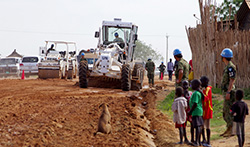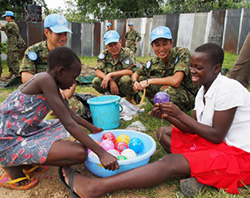Home > Highlighting JAPAN > Highlighting Japan APRIL 2013 > Support for the Future of South Sudan
Highlighting JAPAN
COVER STORY: FOSTERING GROWTH in AFRICA
Support for the Future of South Sudan
Japan has been involved in a number of activities for contributing to the peace and stability of Africa. One of these activities is the participation of Japan Self-Defense Forces (JSDF) in UN peacekeeping operations in South Sudan. South Sudan is the newest country in the world, having become independent in July 2011 after the end of a civil war that lasted more than twenty years. The JSDF is currently assisting with South Sudan's nation-building effort. Osamu Sawaji of the Japan Journal interviewed two high-ranking officers of the JSDF who have been dispatched to South Sudan.

JSDF members carry out road rehabilitation work in Juba, South Sudan.
Credit: COURTESY OF MINISTRY OF DEFENSE
On the sidelines of its independence, the United Nations established the United Nations Mission in the Republic of South Sudan (UNMISS). The mission of UNMISS is to help South Sudan create an environment in which it can work to achieve sustained peace and security and nation-building. At the request of the United Nations, the Japanese government has been dispatching a contingent to UNMISS from the JSDF since January 2012 in addition to staff officers.
"As the JSDF has earned a high international reputation for the activities it undertook overseas in the past, there were strong expectations from UNMISS and the South Sudanese government regarding the activities of the JSDF, particularly in terms of infrastructure developments," says Lieutenant Colonel Teruo Sakama. "As the JSDF was thoroughly trusted due to its strong performance, we also felt the pressure of not betraying such trust."
Lieutenant Colonel Sakama headed approximately 210 members of the 1st Unit of the JSDF engineer unit during the period between January and June 2012.
As most of the roads are unpaved in South Sudan, many become covered with puddles and mud when it rains, making driving difficult. Moreover, the accumulated rainwater can cause an unhygienic environment and lead to health problems such as malaria and diarrhea among the local people. For these reasons, one of the primary missions of the engineer unit is to improve the conditions of these roads. The unit members have been developing residential roads and main roads using equipment such as bulldozers and road rollers. During the operations, the unit members always make sure that the roads are gently sloped so that the rainwater does not remain on their surfaces, and gutters are built at the sides of the roads to ensure that the rainwater flows away. In addition to taking care of the roads, in response to the United Nations High Commissioner for Refugees (UNHCR), the JSDF constructed accommodation facilities within the way station, where displaced people who escaped the civil war can take shelter on their way back to their native land.

JSDF members make and play with water balloons with children at the orphanage in Juba, South Sudan.
Credit: COURTESY OF MINISTRY OF DEFENSE
The unit members also interact with the people of South Sudan. For example, they commenced communications with an orphanage for girls run by an NGO in Juba after they built a house for the security guard to live in. The unit members now visit the orphanage almost every weekend on a volunteer basis and carry out cleaning and repair work on the buildings, and spend time playing sports with the children, such as volleyball and badminton, and playing with toys, such as kendama, a Japanese traditional toy, and stilts.
"South Sudan has numerous problems, but the country is extremely vibrant and I believe it has a great future," says Colonel Toru Namatame. "By carefully listening to the requests of the local people and tailoring work plans to the actual sites, we are providing support that will pave the way for the future of South Sudan." Colonel Namatame headed the Coordination Center during the period from January to December 2012. The duty of the Coordination Center is to coordinate engineering tasks with UNMISS. The tasks that the JSDF undertakes, such as road rehabilitation, are determined through deliberations between the JSDF and UNMISS in line with its mandate as well as by taking into account the effectiveness of the benefits for the local people.
One of the road rehabilitation operations undertaken by approximately 330 members of the 3rd Unit of the JSDF engineer unit is the rehabilitation of a main road connecting Juba to Yei, a city approximately 120 km from Juba and located near the national border of Uganda. The area surrounding Yei is expected to become a grain belt, and it is believed that once completed, the road will make it possible to supply more crops to Juba. "I also served in UN peacekeeping operations in Mozambique in Africa twenty years ago. It was the time when Mozambique had just emerged from its civil war, and the country was devastated. However, I understand that Mozambique is now enjoying economic and social development," says Colonel Namatame. "I hope that South Sudan will follow the same path as Mozambique for future prosperity."
© 2009 Cabinet Office, Government of Japan






